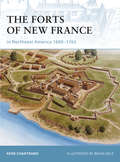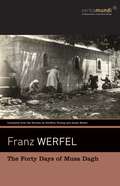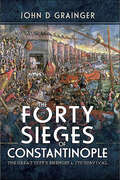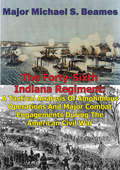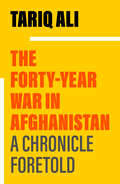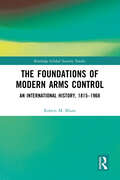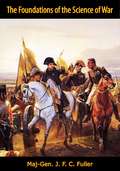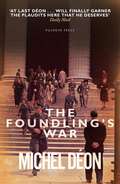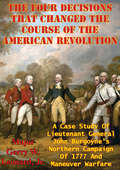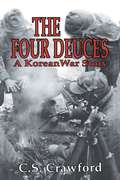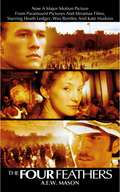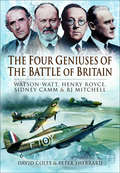- Table View
- List View
The Forts of New France in Northeast America 1600-1763
by Brian Delf Rene Chartrand"New France" consisted of the area colonized and ruled by France in North America from the 16th to the 18th century. At its peak in the early 18th century its territory was huge, stretching from Newfoundland to the Gulf of Mexico. This title reviews the lengthy chain of forts built to guard the French frontier in the American northeast from the province of Quebec through New York State to Pennsylvania and Indiana. Among the sites examined are forts Chambly, St. Frédéric (Crown Point), Carillon (Ticonderoga), Duquesne (Pittsburgh, PA), Ouiatenon (Quebec) and Vincennes (IN).These forts, some of them well-preserved and popular tourist destinations, ranged from large and elaborate, stone-built structures with classic, Vauban-style elements, to little more than cabins surrounded by stockades. Some, such as Chambly, looked more like medieval castles in their earliest forms. Formerly Senior Curator with National Historic Sites of Canada, historian René Chartrand examines the different fort-types and the French military technology that went into their construction, and describes the strategic vision that led to their construction, their part in the conflicts with the British colonies in the east and the Indian nations of the interior, and their effect on trade.
The Fortune Most Likely To...: Beauty And Her Boss (once Upon A Fairytale, Book 1) / The Sheriff's Nine-month Surprise (match Made In Haven, Book 1) (The Fortunes of Texas: The Rulebreakers #3)
by Marie FerrarellaA powerful first love… An explosive secret…The Fortunes of Texas: The Rulebreakers continues!Dr. Everett Fortunado is sitting on the biggest secret to hit Texas—but nothing’s more shocking than finding Lila Clark working for the Fortunes. Years ago a teen pregnancy forced her to give up their baby…and Everett. Lila’s not one for second chances, but that won’t stop Everett from trying. Because this time around, he knows the meaning of family. And he wants his—with Lila!
The Fortune Tellers' Secret: A heartbreaking and uplifting historical saga
by Maggie MasonTHE BRAND-NEW WARTIME SAGA SERIES BY MAGGIE MASON - PERFECT FOR FANS OF ROSIE GOODWIN, VAL WOOD AND KITTY NEALEBLACKPOOL, 1922.Martha and Trisha may have escaped poverty, but their fortunes have yet to turn. Blissfully happy on her wedding day, Trisha's new fairy-tale romance soon darkens as her husband, Walter, keeps her at arms length. Between his secrecy, and her mother-in-law's coldness , Trisha feels a stranger in her own home, and lonelier than ever...Meanwhile a spectre from Martha's past threatens the happiness she has found with Joshua and Bonnie. When she is called to help in her past love's hour of need, she must decide whether to risk exposing a secret that could cost her the trust of her daughter...With winter fast approaching, Martha and Trisha take warmth and comfort in the strength of their friendship. But will Martha's gift of foresight be enough to see them through?Following on from the events of The Fortune Tellers, this heart-warming family saga can be enjoyed as a standalone story, too.If you love this story, don't miss the next book The Fortune Tellers' Daughters.
The Fortune Tellers' Secret: A heartbreaking and uplifting historical saga
by Maggie MasonTHE BRAND-NEW WARTIME SAGA SERIES BY MAGGIE MASON - PERFECT FOR FANS OF ROSIE GOODWIN, VAL WOOD AND KITTY NEALEBLACKPOOL, 1922.Martha and Trisha may have escaped poverty, but their fortunes have yet to turn. Blissfully happy on her wedding day, Trisha's new fairy-tale romance soon darkens as her husband, Walter, keeps her at arms length. Between his secrecy, and her mother-in-law's coldness , Trisha feels a stranger in her own home, and lonelier than ever...Meanwhile a spectre from Martha's past threatens the happiness she has found with Joshua and Bonnie. When she is called to help in her past love's hour of need, she must decide whether to risk exposing a secret that could cost her the trust of her daughter...With winter fast approaching, Martha and Trisha take warmth and comfort in the strength of their friendship. But will Martha's gift of foresight be enough to see them through?Following on from the events of The Fortune Tellers, this heart-warming family saga can be enjoyed as a standalone story, too.If you love this story, don't miss the next book The Fortune Tellers' Daughters.
The Fortune Tellers: the BRAND NEW heart-warming and nostalgic wartime family saga
by Maggie MasonTHE BRAND-NEW WARTIME SAGA SERIES BY MAGGIE MASON, MUCH-LOVED AUTHOR OF THE HALFPENNY GIRLSTroubles lie ahead - will friendship see them through? BLACKPOOL, 1918.Martha is seventeen and alone in the world. Of Irish descent, her flashing green eyes see into your soul. Foretelling the future is a gift passed down by her late grandmother and is how she earns her living on Blackpool Promenade. Though she spends hours in a little tent, waiting and hoping for a customer.Trisha is Martha's neighbour and quickly becomes her dearest friend, but she is pregnant and married to a brutal man. And when tragedy strikes, she finds herself alone, her future uncertain.Together, on one of the poorest streets in Blackpool, the girls face poverty, as is their lot, but they're determined to help each other any way they can, and they never stop dreaming of a brighter future.Will a chance encounter on the promenade change their fortunes?The first in a brand-new heart-warming family saga series from Maggie Mason. Perfect for fans of Val Wood, Kitty Neale and Rosie Goodwin. And don't miss the next book - The Fortune Tellers' Secret.Readers LOVE Maggie Mason's Blackpool sagas:'5 stars - I wish I could give it more. Wonderful read.''Another must read book''What a brilliant book. I couldn't put it down!''I was hooked from the first page . . . this author is a must read''A totally absorbing read'
The Fortune Tellers: the BRAND NEW heart-warming and nostalgic wartime family saga
by Maggie MasonTHE BRAND-NEW WARTIME SAGA SERIES BY MAGGIE MASON, MUCH-LOVED AUTHOR OF THE HALFPENNY GIRLS'In the grand tradition of sagas set down by the late and great Catherine Cookson' Jean Fullerton on Blackpool LassTroubles lie ahead - will friendship see them through? BLACKPOOL, 1918.Martha is seventeen and alone in the world. Of Irish descent, her flashing green eyes see into your soul. Foretelling the future is a gift passed down by her late grandmother and is how she earns her living on Blackpool Promenade. Though she spends hours in a little tent, waiting and hoping for a customer.Trisha is Martha's neighbour and quickly becomes her dearest friend, but she is pregnant and married to a brutal man. And when tragedy strikes, she finds herself alone, her future uncertain.Together, on one of the poorest streets in Blackpool, the girls face poverty, as is their lot, but they're determined to help each other any way they can, and they never stop dreaming of a brighter future.Will a chance encounter on the promenade change their fortunes?The first in a brand-new series from Maggie Mason, much-loved author of The Halfpenny Girls. A heart-warming family saga about overcoming hardship and the value of friendship. Perfect for fans of Val Wood, Kitty Neale and Rosie GoodwinReaders LOVE Maggie Mason's Blackpool sagas:'5 stars - I wish I could give it more. Wonderful read.''Another must read book''What a brilliant book. I couldn't put it down!''I was hooked from the first page . . . this author is a must read''A totally absorbing read'
The Fortune Tellers: the BRAND NEW heart-warming and nostalgic wartime family saga
by Maggie MasonTHE BRAND-NEW WARTIME SAGA SERIES BY MAGGIE MASON, MUCH-LOVED AUTHOR OF THE HALFPENNY GIRLS'In the grand tradition of sagas set down by the late and great Catherine Cookson' Jean Fullerton on Blackpool LassTroubles lie ahead - will friendship see them through? BLACKPOOL, 1918.Martha is seventeen and alone in the world. Of Irish descent, her flashing green eyes see into your soul. Foretelling the future is a gift passed down by her late grandmother and is how she earns her living on Blackpool Promenade. Though she spends hours in a little tent, waiting and hoping for a customer.Trisha is Martha's neighbour and quickly becomes her dearest friend, but she is pregnant and married to a brutal man. And when tragedy strikes, she finds herself alone, her future uncertain.Together, on one of the poorest streets in Blackpool, the girls face poverty, as is their lot, but they're determined to help each other any way they can, and they never stop dreaming of a brighter future.Will a chance encounter on the promenade change their fortunes?The first in a brand-new series from Maggie Mason, much-loved author of The Halfpenny Girls. A heart-warming family saga about overcoming hardship and the value of friendship. Perfect for fans of Val Wood, Kitty Neale and Rosie GoodwinReaders LOVE Maggie Mason's Blackpool sagas:'5 stars - I wish I could give it more. Wonderful read.''Another must read book''What a brilliant book. I couldn't put it down!''I was hooked from the first page . . . this author is a must read''A totally absorbing read'
The Forty Days of Musa Dagh (Verba Mundi International Literature Series)
by Franz WerfelThe internationally acclaimed novel based on the heroic resistance during the Armenian genocide of 1915. This is the story of how the people of several Armenian villages in the mountains along the coast of present-day Turkey and Syria chose not to obey the Turkish government&’s deportation order. Instead, they fortified a plateau on the slopes of Musa Dagh—Mount Moses—and repelled Turkish soldiers and military police during the summer of 1915 while hoping for the Allies to save them . . . Translator James Reidel and scholar Violet Lutz have revised and expanded the original English translation by Geoffrey Dunlop. The Dunlop translation, had excised approximately 25% of the original text to accommodate the Book-of-the-Month club and to streamline the novel for film adaptation. The restoration of these passages and their new translation provide a fuller picture of the characters&’ lives, especially the hero Gabriel Bagradian, his wife Juliette, their son Stephan, and Iskuhi Tomasian. What is more apparent now is the personal story that Werfel tells, informed by events and people in his own life, in which the author, his wife Alma, his stepdaughter Manon Gropius, and others in his circle are reinvented. Reidel has also revised the existing translation to free Werfel&’s stronger usages from Dunlop&’s softening of meaning, his effective censoring of the novel in order to fit the mores and commercial contingencies of the mid-1930s.&“In every sense a true and thrilling novel . . . It tells a story which it is almost one&’s duty as an intelligent human being to read. And one&’s duty here becomes one&’s pleasure also.&” —New York Times Book Review
The Forty Sieges of Constantinople: The Great City's Enemies & Its Survival
by John D. GraingerThe great city of Byzantion/Constantinople/Istanbul stands on a commanding cape overlooking a busy waterway. It has been the target of repeated attempts to capture it for the past two and a half millennia. Most of these attacks failed, but some did so in spectacular fashion, such as the great Arab sieges. The inhabitants fought hard in almost every siege, with the result that when the city was captured it was also destroyed, or at least suffered a hideous sack. Almost every nation between the Atlantic and the Steppes of Asia have made attempts to capture the city, some repeatedly but only a few - a Roman emperor, the Crusaders, the Turks - have succeeded. And there is no sign that some have given up the hope of taking it - the last sieges were just before and then during the Great War, by the Bulgars, and then by the Allies, who got no closer than Gallipoli, but the city had to submit to enemy occupation when the empire it ruled collapsed. It is still surrounded by envious neighbours, who wish to control it. The city has been besieged forty times, and has been captured on three or four occasions; it cannot be said to be safe yet. It is still 'The City of the World's Desire'.
The Forty-Sixth Indiana Regiment: A Tactical Analysis Of Amphibious Operations And Major Combat Engagements During The American Civil War
by Major Michael S. BeamesThis thesis is an historical analysis of the amphibious operations of the 46th Indiana. The primary research question is whether the amphibious operations of the 46th Indiana were effective towards the Union's success in the Mississippi River valley. Using Marine Corps Doctrinal Publication 1-3, Tactics, this thesis will compare the 46th Indiana's employment of tactics to the Marine Corps' current use of tactics according to doctrine. Tactical concepts that achieve success on the battlefield are achieving a decision, gaining an advantage, being faster, adapting, cooperating, and exploiting success. These six concepts form the foundation of the analysis of the 46th Indiana's operations and tactics during the Civil War. Secondary research areas to determine the effectiveness of the 46th Indiana's amphibious operations are training, command and control, casualty statistics, unit cohesion and morale.
The Forty-Year War in Afghanistan: A Chronicle Foretold
by Tariq AliThe occupation of Afghanistan is over, and a balance sheet can be drawn. These essays on war and peace in the region reveal Tariq Ali at his sharpest and most prescient.Rarely has there been such an enthusiastic display of international unity as that which greeted the invasion of Afghanistan in 2001. Compared to Iraq, Afghanistan became the &“good war.&” But a stalemate ensued, and the Taliban waited out the NATO contingents. Today, with the collapse of the puppet regime in Kabul, what does the future hold for a traumatised Afghan people? Will China become the dominant influence in the country?Tariq Ali has been following the wars in Afghanistan for forty years. He opposed Soviet military interven- tion in 1979, predicting disaster. He was also a fierce critic of its NATO sequel, Operation Enduring Freedom. In a series of trenchant commentaries, he has described the tragedies inflicted on Afghanistan, as well as the semi-Talibanisation and militarisation of neighbouring Pakistan. Most of his predictions have proved accurate. The Forty-Year War in Afghanistan: A Chronicle Foretold brings together the best of his writings and includes a new introduction.
The Foundations of Modern Arms Control: An International History, 1815-1968 (Routledge Global Security Studies)
by Robert M. BlumThis book is an international history of the foundation of modern arms control, highlighting the fact that the instrument is varied, resilient, successful, and enduring.The narrative begins after the Napoleonic wars when newly arisen peace movements focused on arbitration as a path to “ending the war system.” It moves on to the international community’s embrace of “total and complete disarmament” and then to its acceptance of more limited measures by 1968, including the agreements that remain in force today. The book connects the past to the present of multiple negotiations, successful and failed, and underlines how the peace movement increasingly influenced the national policy of the major Western powers, especially the United States. It also highlights the increasing diversification of arms control players, including women and people of color as well as the countries they represented. Based on original research in multinational records and the latest scholarship, the book illustrates the reasons multilateral arms control remains a key instrument of international relations. The chapters are organized both chronologically and thematically, with the result that they cover different amounts of time in order to encompass a given issue and to capture the development of particular threads. The main narrative evolves into a decadeslong quest for a global treaty on “general and complete disarmament,” which otherwise paces the book and shapes its chapters.This book will be of much interest to students of arms control, global governance, peace studies, and International Relations.
The Foundations of the Science of War
by Maj-Gen. J. F. C. FullerThe Foundations of the Science of War by Col. J. F. C. Fuller, first published in 1925, aims, as the title suggests and in the author’s own words, to provide “a foundation of the science of war, or, at least, of a science of war.” Col. Fuller spent over 15 years planning this foundation, and it was his endeavour that it would allow military students to examine it “not only for its own worth, but in order to think of war scientifically, for until we do so we shall never become true artists of war.” Likewise, Col. Fuller hoped the book may be of use to all other interested readers, “not only in studying war, but in studying any of the activities of life.”“In this book I am attempting something new—at least, new since the days of Henry Lloyd and Robert Jackson; for, as far as I am aware, these are my only two fellow-countrymen who have attempted to reduce war to a science. In a small way I am trying to do for war what Copernicus did for astronomy, Newton for physics, and Darwin for natural history. My book, I believe, is the first in which a writer has attempted to apply the method of science to the study of war; for Lloyd, Jackson, Clausewitz, Jomini, and Foch did not do this. In a few years’ time I hope that it will be superseded by many a better work, so that we all may begin to understand the nature of war, and thereby discover, not only how to prepare for war, but how to restrict its ravages; how to harness it, and possibly, also, how to transmute the destructive ferocity of the ape into the creative gentleness of the angel.”—Col. J. F. C. Fuller
The Founders of the Massachusetts Bay Colony: A Careful Research Of The Earliest Records Of Many Of The Foremost Settlers Of The New England Colony
by Sarah Sprague Saunders SmithUncover the rich history and enduring legacy of the Massachusetts Bay Colony with Sarah Sprague Saunders Smith's insightful work, "The Founders of the Massachusetts Bay Colony." This meticulously researched book offers a comprehensive account of the men and women who established one of the most significant early settlements in New England, shaping the future of the United States.Smith delves into the lives, motivations, and challenges faced by the Puritan founders who, driven by a quest for religious freedom, left their homeland to build a new society in the New World. Through engaging narrative and detailed historical analysis, she brings to life the stories of these pioneering individuals, from well-known leaders like John Winthrop and Thomas Dudley to the many lesser-known settlers who played crucial roles in the colony's development.The book provides a vivid portrayal of the early days of the Massachusetts Bay Colony, from the perilous Atlantic crossing and the harsh realities of establishing a settlement in an unfamiliar land, to the creation of a thriving community grounded in strong religious and ethical principles. Smith explores the colony's governance, economic strategies, and social structures, highlighting the founders' vision and determination to create a "city upon a hill.""The Founders of the Massachusetts Bay Colony" is an essential read for history enthusiasts, scholars of early American history, and anyone interested in the roots of the United States. This book stands as a testament to the courage, faith, and resilience of the men and women who laid the groundwork for what would become one of the most influential regions in early America. Smith’s work is a tribute to their enduring contributions and the lasting legacy of the Massachusetts Bay Colony.
The Founding: The Morland Dynasty, Book 1 (Morland Dynasty #1)
by Cynthia Harrod-EaglesThe twenty-three volumes of the Morland Dynasty series has been completely repackaged in the most elegant style, using contemporaneous artwork for each period. This wonderful series opens with the back drop of the Wars of the Roses with the marriage between Eleanor Morland and a scion of the influential house of Beaufort. It is a union which establishes the powerful Morland dynasty and in the succeeding volumes of this rich tapestry of English life, we follow their fortunes through war and peace, political upheaval and social revolution, times of pestilence and periods of plenty, and through the vicissitudes which afflict every family - love and passion, envy and betrayal, birth and death, great fortune and miserable penury.The Morland Dynasty is entertainment of the most addictive kind.
The Founding: The Morland Dynasty, Book 1 (Morland Dynasty #1)
by Cynthia Harrod-Eagles"Brilliant, a definite page turner. They combine real historical events with fascinating fictional characters.The twenty-three volumes of the Morland Dynasty series has been completely repackaged in the most elegant style, using contemporaneous artwork for each period. This wonderful series opens with the back drop of the Wars of the Roses with the marriage between Eleanor Morland and a scion of the influential house of Beaufort. It is a union which establishes the powerful Morland dynasty and in the succeeding volumes of this rich tapestry of English life, we follow their fortunes through war and peace, political upheaval and social revolution, times of pestilence and periods of plenty, and through the vicissitudes which afflict every family - love and passion, envy and betrayal, birth and death, great fortune and miserable penury...The Morland Dynasty is entertainment of the most addictive kind.
The Founding: The Morland Dynasty, Book 1 (Morland Dynasty #1)
by Cynthia Harrod-Eagles"Brilliant, a definite page turner. They combine real historical events with fascinating fictional characters.The twenty-three volumes of the Morland Dynasty series has been completely repackaged in the most elegant style, using contemporaneous artwork for each period. This wonderful series opens with the back drop of the Wars of the Roses with the marriage between Eleanor Morland and a scion of the influential house of Beaufort. It is a union which establishes the powerful Morland dynasty and in the succeeding volumes of this rich tapestry of English life, we follow their fortunes through war and peace, political upheaval and social revolution, times of pestilence and periods of plenty, and through the vicissitudes which afflict every family - love and passion, envy and betrayal, birth and death, great fortune and miserable penury...The Morland Dynasty is entertainment of the most addictive kind.
The Foundling Bride
by Helen DicksonFrom orphan to blushing bride! Lowena Trevanion has never known her family. Abandoned as a baby, she was eventually taken in by the wealthy Carberrys as a servant. But she has always wanted to truly belong somewhere... When Marcus Carberry returns from the army, he can't believe the innocent girl he left behind has blossomed into a stunning woman. The difference in their stations means their love can never be... Yet the closer Marcus gets, the more he wants to give this orphan the happy-ever-after she deserves!
The Foundling's War
by Michel DéonIn the aftermath of French defeat in July 1940, twenty-year-old Jean Arnaud and his ally, the charming conman Palfy, are hiding out at a brothel in Clermont-Ferrand, having narrowly escaped a firing squad. At a military parade, Jean falls for a beautiful stranger, Claude, who will help him forget his adolescent heartbreak but bring far more serious troubles of her own.Having safely reached occupied Paris, the friends mingle with art smugglers and forgers, social climbers, showbiz starlets, bluffers, swindlers and profiteers, French and German, as Jean learns to make his way in a world of murky allegiances. But beyond the social whirl, the war cannot stay away forever...In this sequel to the acclaimed novel The Foundling Boy, Michel Déon's hero comes to manhood not through combat but by discovering truths about desire and possession, sex and love, and the nuances that lie between crudely drawn battle lines.
The Four Days' Battle of 1666: The Greatest Sea Fight of the Age of Sail
by Frank L. Fox&“An excellent piece of work, not just as an account of the Four Days&’ Battle itself but also for its account of the entire Second Anglo-Dutch War&” (HistoryOfWar.org). On June 1, 1666, a large but outnumbered English fleet engaged the Dutch off the mouth of the Thames in a colossal battle that was to involve nearly 200 ships and last four days. False intelligence had led the English to divide their fleet to meet a phantom threat from France, and although the errant squadron rejoined on the final day of the battle, it was not enough to redress the balance. Like many a defeat, it sparked controversy at the time, and has been the subject of speculation and debate ever since. The battle was an event of such overwhelming complexity that for centuries it defied description and deterred study, but this superbly researched book is now recognized as the definitive account. It provides the first clear exposition of the opposing forces, fills many holes in the narrative and answers most of the questions raised by the actions of the English commanders. It makes for a thoroughly engrossing story, and one worthy of the greatest battle of the age of sail.
The Four Decisions That Changed The Course Of The American Revolution: A Case Study Of Lieutenant General John Burgoyne’s Northern Campaign Of 1777 And Maneuver Warfare
by Major Gerry W. Leonard Jr. USMCDuring the winter of 1776-1777, Lieutenant General John Burgoyne, who at the time was second in command of Britain's Northern Army (based in Canada), proposed his "Thoughts for Conducting the War from the Side of Canada" to King George III. Unhappy with the lack of success during the Northern Campaign of 1776, King George approved Burgoyne's campaign plan and chose Burgoyne to lead the Northern Army. Burgoyne's plan was a simple two-pronged attack from Quebec to seize Albany and secure the Lake Champlain-Lake George-Hudson River Waterway. After seizing Albany, Burgoyne expected to linkup with a third force attacking north from New York City.While strategic policies and decisions negatively affected Burgoyne's campaign and the third force from New York City never really materialized, Burgoyne's campaign concept was both feasible and achievable. Of the two forces attacking south from Canada, Burgoyne commanded the main attack force of 9,000-plus soldiers and Brigadier General Barry St Leger commanded a 2,000 man diversionary force. In his "Thoughts for Conducting the War from the Side of Canada," Burgoyne intended to seize Fort Ticonderoga and develop a theater logistics base before advancing, via Lake Champlain-Lake George-Hudson River waterway, on Albany. Simultaneous with Burgoyne's advance on Albany from the north, St Leger was advancing on Albany from the west, using the St Lawrence River-Lake Erie-Mohawk River waterway as a his axis of advance. Ultimately, Burgoyne believed that both attacks would make the Americans to split their forces in order to defend Albany.While the British tackled supply problems, the Americans seized the initiative by harassing and delaying the British and destroying the only usable roads. By September, the Americans were dictating the terms of each engagement and controlling the tempo of the campaign.
The Four Deuces: A Korean War Story
by C. S. CrawfordThese memoirs are not an attempt to answer, solve, or resolve the problems arising from or about the three-year-long Korean War or the much longer stalemate that followed. This story was written to let you know how one very young, very scared marine saw his very first war and how he reacted to the killing and the mayhem of it. The stories are my view of that war, a war gone to ground in the trench lines. Dig into the stories and you may find something you were not expecting.I am well aware that my view of the Korean War has no historical importance. Still, it is my view, and I want to share it with you. I do not have a cause to plead or an ax to grind, and that alone ought to count for something. My memoirs are selective and most certainly tainted with time. My recollections are a lot like boot mines, and ought to be approached with caution. I was a grunt, a Four Deuce forward observer, assigned to duty with a marine infantry company every time the 1st Marine Regiment went back up on line. During the time I was in Korea my boondockers were firmly planted in trench-line mud. When I came home in September 1952, I was proud that I had helped in the attempt to stop Communism in Korea. I was proud of all the men I served, and served with, and I was a little bit proud of myself, too.From the Trade Paperback edition.
The Four Feathers
by A. E. W. MasonThis classic adventure story -- first published in1902 -- gains new life in a blockbuster motion picture epicfrom Paramount Pictures and Miramax Films and remainsa timeless novel of love, honor, and courage. A Soldier's Shame. . . It is 1882 and British officer Harry Feversham has it all: a loving fiancée, the camaraderie of fellow soldiers, a bright future in a nation at the height of its imperial power. But before he is deployed to battle in Africa, he resigns -- and receives white feathers, symbols of cowardice, from three friends. . . and then a fourth from his fiancée. A Love Lost. . . Ethne Eustace has pushed Harry out of her life, but not out of her mind. Still, when another suitor comes calling she makes a decision that could destroy Harry. . . and alter her life forever. A Heroic Redemption. . . His world in tatters, Harry goes undercover in Africa to win back the respect of his comrades. From the bustling markets of Cairo to the sizzling sands of Omdurman prison, he fights with everything he has to bring honor back to his name. . . and Ethne back to his heart.
The Four Feathers
by A.E.W. MasonThis classic adventure story -- first published in1902 -- gains new life in a blockbuster motion picture epicfrom Paramount Pictures and Miramax Films and remainsa timeless novel of love, honor, and courage. A Soldier's Shame. . . It is 1882 and British officer Harry Feversham has it all: a loving fiancée, the camaraderie of fellow soldiers, a bright future in a nation at the height of its imperial power. But before he is deployed to battle in Africa, he resigns -- and receives white feathers, symbols of cowardice, from three friends. . . and then a fourth from his fiancée. A Love Lost. . . Ethne Eustace has pushed Harry out of her life, but not out of her mind. Still, when another suitor comes calling she makes a decision that could destroy Harry. . . and alter her life forever. A Heroic Redemption. . . His world in tatters, Harry goes undercover in Africa to win back the respect of his comrades. From the bustling markets of Cairo to the sizzling sands of Omdurman prison, he fights with everything he has to bring honor back to his name. . . and Ethne back to his heart.
The Four Geniuses of the Battle of Britain: Watson-Watt, Henry Royce, Sydney Camm & RJ Mitchell
by David Coles Peter Sherrard"Had it not been for the vital contributions of the four men and their inventions described in this book the Battle of Britain could not have been won by the Royal Air Force. Each of these brilliant men contributed enormously to the aircraft and equipment upon which the gallant RAF fighter pilots depended to take on and defeat the hitherto overpowering Luftwaffe during Hitlers European onslaught. Watson Watt was the moving force behind Britains vital early warning radar network that allowed Allied fighter aircraft to intercept the incoming German bomber raids. Henry Royce was the driving force throughout the development of the Merlin engine that powered both the Hurricane and Spitfire.Sydney Camm persevered with the design of the Hawker Hurricane which was to destroy more Luftwaffe bombers in the Battle than any other type. It was amazingly resilient and provided an extremely stable gun platform. Never living long enough to see the success of his beautiful Spitfire, RJ Mitchell was the designer of the only British aircraft that could outperform the Nazi Bf 109s fighters and which allowed the attacking Hurricanes a little more safety while doing their job below. This is the story of those men behind the scene of the greatest air battle in history. "
